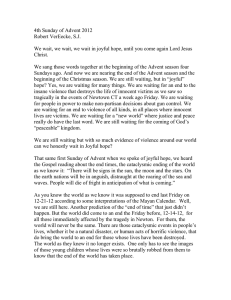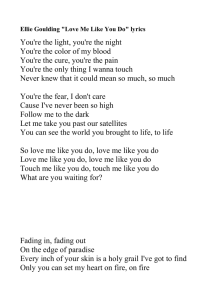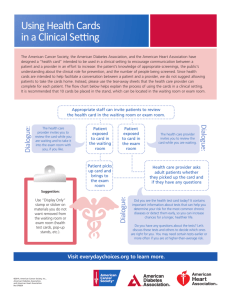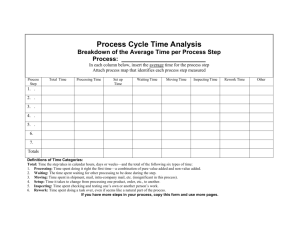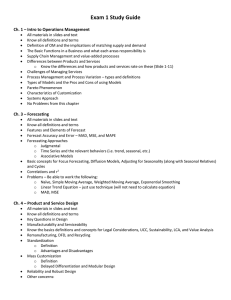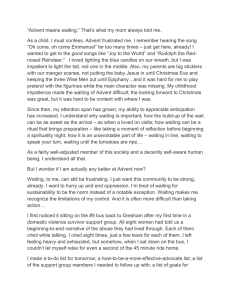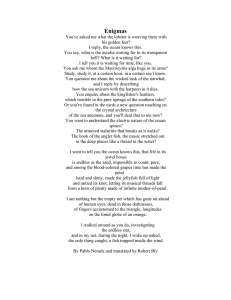1 Sunday of Advent – Year C
advertisement
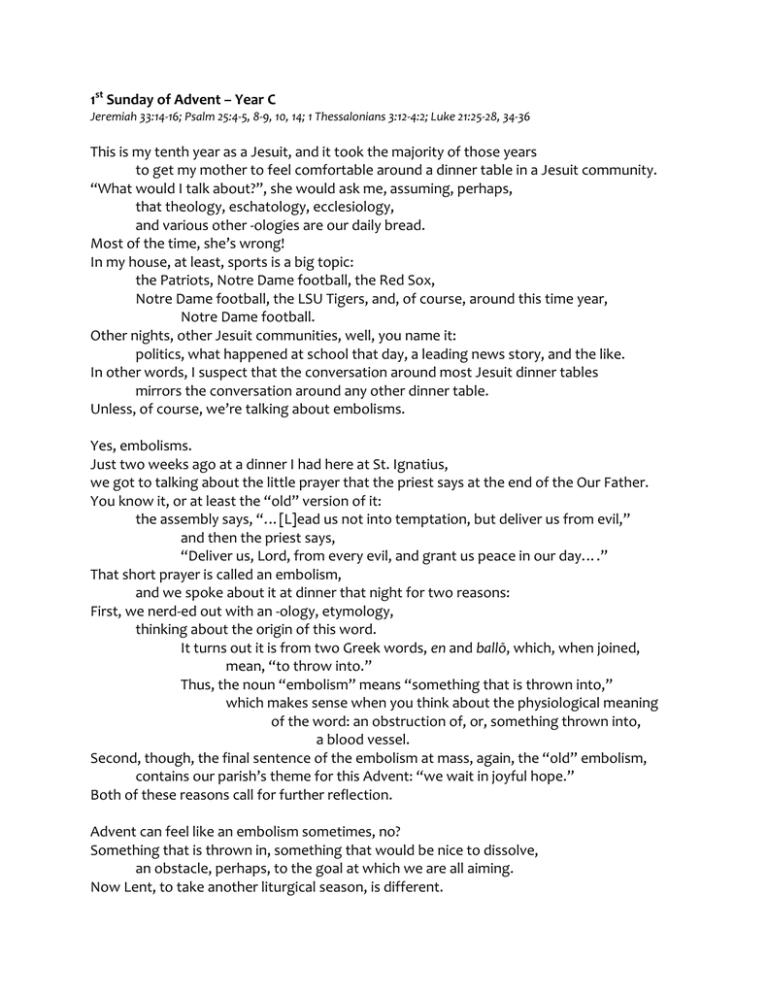
1st Sunday of Advent – Year C Jeremiah 33:14-16; Psalm 25:4-5, 8-9, 10, 14; 1 Thessalonians 3:12-4:2; Luke 21:25-28, 34-36 This is my tenth year as a Jesuit, and it took the majority of those years to get my mother to feel comfortable around a dinner table in a Jesuit community. “What would I talk about?”, she would ask me, assuming, perhaps, that theology, eschatology, ecclesiology, and various other -ologies are our daily bread. Most of the time, she’s wrong! In my house, at least, sports is a big topic: the Patriots, Notre Dame football, the Red Sox, Notre Dame football, the LSU Tigers, and, of course, around this time year, Notre Dame football. Other nights, other Jesuit communities, well, you name it: politics, what happened at school that day, a leading news story, and the like. In other words, I suspect that the conversation around most Jesuit dinner tables mirrors the conversation around any other dinner table. Unless, of course, we’re talking about embolisms. Yes, embolisms. Just two weeks ago at a dinner I had here at St. Ignatius, we got to talking about the little prayer that the priest says at the end of the Our Father. You know it, or at least the “old” version of it: the assembly says, “…[L]ead us not into temptation, but deliver us from evil,” and then the priest says, “Deliver us, Lord, from every evil, and grant us peace in our day….” That short prayer is called an embolism, and we spoke about it at dinner that night for two reasons: First, we nerd-ed out with an -ology, etymology, thinking about the origin of this word. It turns out it is from two Greek words, en and ballō, which, when joined, mean, “to throw into.” Thus, the noun “embolism” means “something that is thrown into,” which makes sense when you think about the physiological meaning of the word: an obstruction of, or, something thrown into, a blood vessel. Second, though, the final sentence of the embolism at mass, again, the “old” embolism, contains our parish’s theme for this Advent: “we wait in joyful hope.” Both of these reasons call for further reflection. Advent can feel like an embolism sometimes, no? Something that is thrown in, something that would be nice to dissolve, an obstacle, perhaps, to the goal at which we are all aiming. Now Lent, to take another liturgical season, is different. It lasts a full 40 days, and for those of us who give up our favorite foods during it, we likely know that that tally does not include Sundays. So it is a long season. It stands on its own. It is more of a giant roadblock with warning lights than it is a tiny embolism. But Advent? This year it lasts only 23 days, and of those days, the liturgical color is purple (or pink) for only 17 – barely 2.5 weeks. If it feels like Advent is something of an afterthought, something thrown in there, a time for toe-tapping and watch-glancing, then I think we are well on our way to experiencing a key dynamic of this season: waiting. When we wait, and if we wait in hope, and moreover, if that hope is a joyful hope – if we wait in joyful hope – these next 23 days reveal who God is for us. We wait. Like it or not, waiting is basically a passive thing. I’m not in control. Christmas arrives 23 days from now, no matter how I spend those days. I cannot hurry it; I cannot slow it; I can only wait for it. Yet not all waiting is the same. I think it can be helpful here to distinguish between focused and distracted waiting. I wait in a distracted fashion, for instance, when I am in a doctor’s office, looking for hidden shapes in a Highlights magazine. I am doing whatever I can to pass the time and to distract myself from a frustrating truth: I have been sitting in this seat for an hour, and I’m pretty sure that guy, who’s getting to see the doctor now, arrived after me. My niece embodies focused waiting for me, or at least a two-year-old’s version of it. Her birthday is December 19, and, since we are still working on numbers, she wakes up every morning, asking, “Is today my birthday?!” Every day! Sometimes she will ask again during the day, after a long nap. Her waiting is focused, as active as something passive can possibly be. How do we wait? How can we make our waiting more focused these 23 days? We wait in hope. Focused as our waiting might be, it need not be hope-filled. The waiting of a family outside an ICU in a hospital will surely be focused, but it might also be very bleak. 2 And that, sadly, is entirely appropriate all too often. When we say that our Advent waiting is done in hope, we are, I think, saying two things: First, we know there is something good at the end of it, namely, Christmas and all the celebration – liturgical and within our families – it brings with it. But we are also saying that that good comes not just at the end of 23 days, but at the end of all days. Recall the embolism: we wait in joyful hope for the coming of our Savior, Jesus Christ. A coming that we re-member at Christmas, as we anticipate the final realization of the Kingdom on the last day. How do we wait in hope? How does our waiting look forward to the coming of Christ at Christmas and at the end of time? We wait in joyful hope. Without joy, our waiting in hope runs the risk of being a private affair, and this is profoundly contrary to what Christmas is all about. After all, as soon as the child is born, the news of his birth must be told to the shepherds, that ragtag group, patrons of all who are at the right place at the right time: “Do not be afraid,” says the angel, “for behold, I proclaim to you good news of great joy that will be for all the people. For today in the city of David a savior has been born for you who is Messiah and Lord. And this will be a sign for you: you will find an infant wrapped in swaddling clothes and lying in a manger.” 1 How do we wait in joyful hope? How does what we know is coming become “good news of great joy” for us? If we wait in joyful hope, these next 23 days reveal who God is for us. And who is that? To whom do we say, “Come!”? Come, O Wisdom; Come, O Lord; Come, O Flower of Jesse’s stem; Come, O Key of David; Come, O Radiant dawn; Come, O Desire of nations; Come, O, Come, Emmanuel – God with us; Come! We are waiting. 1 Luke 2:10-12. 3
